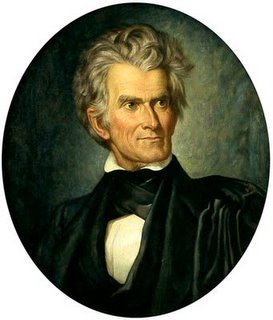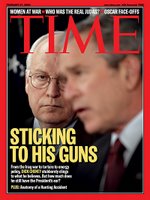 [[H I S T O R Y]] * I’m not yet deluded enough to believe that Dick Cheney will peacefully resign from the U.S. vice presidency, following his shooting earlier this month of millionaire Texas attorney Harry Whittington and the ensuing uproar. He and George W. Bush are far too fond of power to give it up without a fight--or an impeachment. And Bush doesn’t have the balls to demand that his second-in-command step down, no matter how many attorneys Cheney plugs full of birdshot, or how much damage he does to the Republican Party’s hopes of maintaining control of Capitol Hill. Besides, veep resignations are extremely rare in the United States. Of the 46 men who’ve served in that mostly feeble office, only two have resigned before their terms ended.
[[H I S T O R Y]] * I’m not yet deluded enough to believe that Dick Cheney will peacefully resign from the U.S. vice presidency, following his shooting earlier this month of millionaire Texas attorney Harry Whittington and the ensuing uproar. He and George W. Bush are far too fond of power to give it up without a fight--or an impeachment. And Bush doesn’t have the balls to demand that his second-in-command step down, no matter how many attorneys Cheney plugs full of birdshot, or how much damage he does to the Republican Party’s hopes of maintaining control of Capitol Hill. Besides, veep resignations are extremely rare in the United States. Of the 46 men who’ve served in that mostly feeble office, only two have resigned before their terms ended.The first of those was John C. Calhoun, an outspoken, South Carolina war hawk who was originally elected to the U.S. House of Representatives in 1810, but within a few years was selected by President James Monroe as his secretary of war. During the much-disputed presidential election of 1824, Calhoun threw his lot in with Monroe’s secretary of state, John Quincy Adams of Massachusetts, against upstart Tennessee general-turned-politician Andrew Jackson, the Democrat. That alliance helped ensure Adams’ election by the U.S. House of Representatives, and Calhoun was subsequently installed as the new president’s V.P., though Calhoun would come in time to disapprove of what he interpreted as Adams’ favoritism toward the Northern states. Interestingly, after the election of 1828, in which Jackson again campaigned against Adams--but this time won the presidency--Calhoun stayed on in the vice president’s office. However, Calhoun soon fell out with Old Hickory too, as a result of the veep’s endorsement of the right of individual states to ignore federal laws they deemed to be unconstitutional (and to secede from the Union if necessary in protest). The last straw for Jackson may have been Calhoun’s snubbing of Margaret “Peggy” Eaton, a woman with an allegedy sordid past who was married to Jackson’s secretary of war--and enjoyed the president as an unflagging defender. In 1832, Calhoun resigned the vice presidency in order to run (successfully) for the U.S. Senate, making room for Martin Van Buren, the charming and politically deft former governor of New York, as Jackson’s new veep.
It was another 141 years before the next vice president resigned: Spiro Agnew. A onetime Republican governor of Maryland, Agnew was elected as Richard M. Nixon’s V.P. in 1968. Even before Nixon became the first president ever to resign from office, as a result of the Watergate scandal, Agnew stepped down in October 1973. Soon afterwards, he pleaded “no contest” to a criminal charge of tax evasion, which stemmed from his reported acceptance of $29,500 in bribes during his tenure as governor. (Rather than serving jail time, Agnew was fined $10,000 and given three years’ probation.) House Republican Minority Leader Gerald Ford replaced Agnew, and succeeded to the presidency after Nixon left office in August 1974.
Arguably both the most influential and the “worst vice president ever,” Dick Cheney had become--even long before the quail-hunting debacle--a principle focus of public displeasure with the Bush White House. And the fact that he was largely unapproachable--hidden out for much of the time after the September 11, 2001, terrorist attacks in an “undisclosed location” didn’t enhance his likability, especially with the national news media. As Newsweek columnist Jonathan Alter writes this week, Cheney’s “message to the Washington press corps is the same as the one he delivered to Sen. Patrick Leahy in the Senate cloakroom, when the Democrat had the temerity to criticize him: ‘Go f--- yourself.’ By not holding a press conference since 2002, Cheney is telling the men and women assigned to cover the White House that they are irrelevant. No wonder they went crazy after learning of the shooting accident from a Texas paper.” Alter adds:
The shooting could hardly be a better metaphor for Cheney. It neatly packages his faulty judgment, insularity and arrogance in a story that is not cataclysmic on its own terms but will prove hard to forget. That’s too bad for Cheney, and certainly for Harry Whittington. But it is a blessing for anyone hoping to restore some accountability to a government that increasingly believes it is a law unto itself.However, the majority of Americans still aren’t convinced that Cheney has become a liability, either to the Bush administration or to the nation’s future. A new Time magazine poll finds 41 percent of respondents saying that the veep remains an asset to the prez, while 37 percent contend he’s a “damaging” influence. And though 58 percent declare that he’s “too secretive,” Americans continue to believe--by a 46 percent to 45 percent margin--that Cheney has the country’s best interests at heart. While 65 percent of respondents to the Time poll think Cheney “should have immediately taken public responsibility” for the Whittington shooting, rather than having to be talked into making a statement by the prez, there’s no groundswell yet for the veep’s resignation over the Texas incident.
 It’s more likely that Cheney will play the good soldier, and try once more to disappear into the polished West Wing woodwork. With Bush’s administration beset by scandals, what remains of the prez’s agenda under threat of hijacking by right-wing special interests (which are looking to this White House for, among other things, a constitutional amendment against same-sex marriage), and GOP aspirants to the presidency deliberately defying Bush’s wishes on everything from a congressional investigation into his warrantless domestic spying program to an administration proposal that would turn management of six major U.S. seaports over to a United Arab Emirates company, Bush may need Dick Cheney more than ever. Even if, as Newsweek reports, the veep’s “aloofness from the ebb and flow of politics and public opinion has ... dulled his senses in a way that is not helpful to his boss, who has been busy lately defending his administration from criticism that it was badly out of touch during Hurricane Katrina.” If the cost of his help should be the occasional shooting of some pesky lawyer or maybe even a Democratic critic or two ... well, Bush can always send surrogates out to minimize the scandals and out-shout administration opponents guesting on television’s conservative-friendly Sunday-morning talk shows. That tactic has worked so many times in the past, why not keep it up?
It’s more likely that Cheney will play the good soldier, and try once more to disappear into the polished West Wing woodwork. With Bush’s administration beset by scandals, what remains of the prez’s agenda under threat of hijacking by right-wing special interests (which are looking to this White House for, among other things, a constitutional amendment against same-sex marriage), and GOP aspirants to the presidency deliberately defying Bush’s wishes on everything from a congressional investigation into his warrantless domestic spying program to an administration proposal that would turn management of six major U.S. seaports over to a United Arab Emirates company, Bush may need Dick Cheney more than ever. Even if, as Newsweek reports, the veep’s “aloofness from the ebb and flow of politics and public opinion has ... dulled his senses in a way that is not helpful to his boss, who has been busy lately defending his administration from criticism that it was badly out of touch during Hurricane Katrina.” If the cost of his help should be the occasional shooting of some pesky lawyer or maybe even a Democratic critic or two ... well, Bush can always send surrogates out to minimize the scandals and out-shout administration opponents guesting on television’s conservative-friendly Sunday-morning talk shows. That tactic has worked so many times in the past, why not keep it up?DEFINING MOMENTS: In judging how Dick Cheney’s accidental shooting of an Austin attorney might be remembered by history, Los Angeles Times staff writer Mark Z. Barabak opines: “Howard Dean screamed. Dan Quayle made a hash of the word ‘potato.’ Jimmy Carter fended off a wild-eyed rabbit. Like pages in a political scrapbook, those odd episodes endure years, even decades, after the pundits and late-night comics have exhausted their high and low possibilities. Now, Vice President Dick Cheney and his misbegotten quail hunt seem destined to join that collection of frozen-frame images stored in the nation’s collective memory. Together, these incidents and others--such as President George H.W. Bush’s supposed befuddlement at a grocery store scanner--share certain threads.” Read on.
AND THEN MAYBE TOM DELAY FOR V.P.?: Speaking to an audience in San Antonio, Texas, on Tuesday, Pulitzer Prize-winning journalist Bob Woodward of The Washington Post made what seems the most unlikely prediction for the 2008 presidential race. “You’re going to think I’m crazy,” he said, “but you heard it here first. I think [Republicans] could nominate Dick Cheney.” Read on.
READ MORE: “Cheney: From Dead Quail to Lame Duck,” by Ari Melber (The Huffington Post); “Media Employ Verbal Gymnastics to Avoid Saying ‘Cheney Shot Hunting Partner’” (Media Matters); “Bush Critics You Should Trust: A Guide to the Conservatives and Republicans Who Have Turned on the President,” by John Dickerson (Slate); “Time for an Extreme Makeover at the White House,” by Nicholas Kristof (The New York Times); “Vice President Shoots Himself in the Foot,” by Gene Lyons (Arkansas Democrat-Gazette).







1 comment:
Haven't you heard? The so-called neoconservative movement is already dead, according to one of its prime architects, Francis Fukuyama. Read more at:
http://news.scotsman.com/international.cfm?id=266122006
-- Jeff
Post a Comment